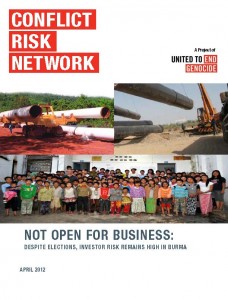Not Open for Business: Despite Elections, Investor Risk Remains High in Burma
By Conflict Risk Network • April 18, 2012 The April 1 Burmese by-elections are being heralded as a great success both for the people of Burma and for the international community after more than a decade of sanctions. While there is cause to celebrate in the wake of initial reforms by President Thein Sein and the electoral victory of Nobel Laureate Aung San Suu Kyi, high levels of risk for investors – and the people of Burma – remain.
The April 1 Burmese by-elections are being heralded as a great success both for the people of Burma and for the international community after more than a decade of sanctions. While there is cause to celebrate in the wake of initial reforms by President Thein Sein and the electoral victory of Nobel Laureate Aung San Suu Kyi, high levels of risk for investors – and the people of Burma – remain.
Conflict Risk Network, a project of United to End Genocide, is a network of institutional investors, financial service providers and related stakeholders calling upon corporate actors to fulfill their responsibility to respect human rights and to take steps that support peace and stability in areas affected by genocide and mass atrocities. Our goal is to increase such behavior by corporate actors, and thereby reduce conflict risk.
Not Open for Business: Despite Elections, Investor Risk Remains High in Burma highlights specific industries, projects and corporate activities that have the potential to drive conflict and create or exacerbate an environment conducive to mass atrocities in Burma.
This paper concludes with recommendations to investors regarding their holdings in corporations currently operating in Burma or those seeking to enter the country. These recommendations urge investors to:
- Actively engage with corporations doing business in Burma regarding the appropriate actions required to avoid, cease, or remedy adverse impacts of their operations with clear and time-oriented targets for improved corporate behaviors;
- Discourage any new investment until the preconditions outlined by United to End Genocide and its partner organizations are achieved in Burma, or at least until sustained peace and stability is reached in the country;
- Advocate for comprehensive human rights due diligence that includes human rights and environmental impact assessments prior to commencing any operations in the country and throughout the lifespan of their projects; and
- Make a public statement in support of a cautious approach to the relaxation of U.S. and EU sanctions and investment bans, from a business risk perspective.
There are opportunities for corporate actors to make positive contributions to peace and stability in Burma. Corporations currently operating in Burma have the opportunity to engage with Burmese decision makers over the steps the government must take to fulfill its responsibility to protect human rights.
Corporations can also contribute directly to the protection of human rights through decisions about their own operations in Burma. Corporations poised to operate in Burma and those already doing so have the potential to create job opportunities, generate revenues that advance economic growth, invest in local communities and to ensure respect for human rights and environmental protection.
However, Burma presents a context where investment can also exacerbate human rights problems and undermine broad-based development. Past cases of extractive sector investments in unstable or conflict-torn areas have shown the potential for companies’ activities to worsen conflict and instability. Areas affected by genocide and mass atrocities differ significantly from stable operating environments. In Burma, the most attractive areas for natural resource investment are precisely the areas in which rights violations are ongoing.
Burma has vast oil, gas, hydropower and mineral potential, located mainly in the ethnic minority regions which continue to be areas of conflict. Keen on tapping these resources, the international business community is already a forceful advocate for overturning the sanctions regime and is actively scouting investment prospects. In particular, major oil companies – Chevron, Total and Exxon Mobil – are seeking to further penetrate Burma’s market.
While international sanctions have limited investment over the last decade, foreign direct investment has recently increased. Foreign investment from 2010 to 2011 represents nine times the cumulative foreign investment between 2006 and 2010, with a staggering percentage benefiting the energy and extractives industries.
Investors should exercise extreme caution. Burma is a volatile area for investors, without the rule of law and without constitutional assurances that the judiciary will protect property or investments. Despite economic reforms over the past year, the military continues to dominate the Burmese economy. It controls the Union of Myanmar Economic Holdings which manages the gem trade and the banking and construction industries. It also oversees the Myanmar Economic Corporation which controls economic activities as varied as tourism, trading companies and the sale of petroleum and natural gas.
The recent reforms and election results provide reasons for cautious optimism in Burma, but the transition is tenuous and incomplete. Given the integration of the military in all aspects of Burma and its historically poor record of democratization and human rights abuse, the international community must seek to use every avenue of engagement with Burma to ensure the establishment of accountability mechanisms to protect human rights. Such mechanisms may be most important of all in the resource-rich ethnic minority regions.
In the coming months, corporations and investors will need more guidance regarding the risks of investment in particular sectors in Burma, as well as a source of reliable information on investment criteria and whether particular corporations are meeting them. Conflict Risk Network stands ready to work with partners in the investment community and civil society to advocate for the highest possible standards on investment in Burma and to ensure that it is implemented.
Download the full report here.
Tags: Conflict Risk Network, Human Rights, Investment, SanctionsThis post is in: Business and Human Rights, Economy, Environmental and Economic Justice, Spotlight
Related PostsInvestors Urge Administration to Take Cautious Approach to Lifting Sanctions on Burma
Burma “Not Open for Business” Investor Network Says









 All posts
All posts